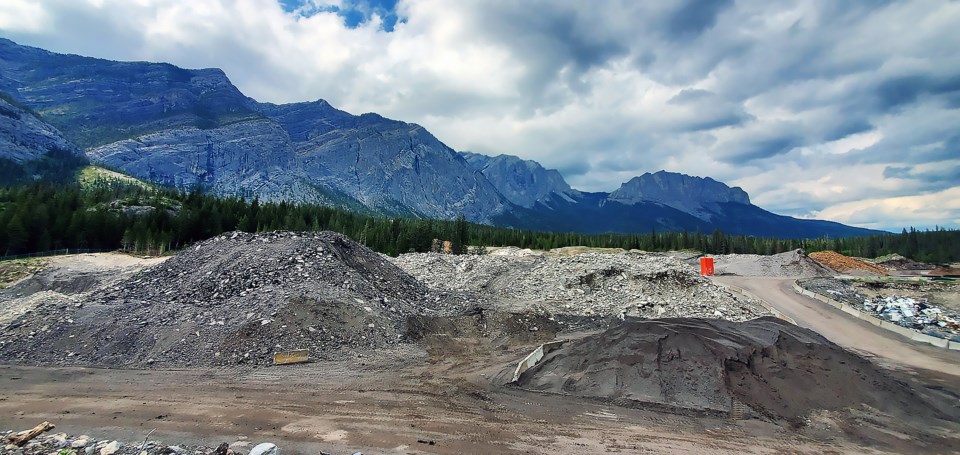MD OF BIGHORN – A largely status quo budget was significantly impacted by rising operating costs and inflation for the Bow Valley Waste Management Commission.
On Nov. 21, the commission approved its 2023 budget, a document that highlighted the pressure felt by issues with supply chain, increase in fuel costs and cost of living increases.
“Whether you’re a household, a municipality, a private business, we’re all facing the same cost increases," said Andrew Calder, the CAO of the waste commission. "We’re lucky we’re well set financially to weather any storm over the next couple of years. We’ve set ourselves well for success,”
The largest expense is salaries, wages and benefits at $1.165 million, while overall expenses are $4.153 million in 2023.
A report to the commission indicated total expenses are budgeted about $250,000 higher than in 2022 due to rising costs. A $900,000 transfer from capital reserves was given commission approval to balance the budget. The net income is expected to be just above break-even for 2023.
Commission Chair Grant Canning brought forward a motion to have staff return to the board with options to create a more formalized process to anticipate and calculate cost of living adjustment wage increases by the second quarter of 2023.
The Banff town councillor said the time will allow the commission to review options, debate the merits of proposals and give staff enough time to put together the report. “The key to me is having a more formalized process,” he said.
Hugh Pettigrew, a commission director representing the Town of Banff, said he supports a cost of living increase to help staff, particularly as inflation has led to significant cost increases and that inflation is "not going to go away any time soon.”
Calder said he looks at the Calgary CPI from August 2021-22 in reaching a proposed number. A cost of living increase – based on Statistics Canada’s CPI rate – was recommended at six per cent for an increase of about $65,000.
“Staff are one of our key assets and we all know what the cost of living is like in this area, so I think it would be wise to invest that bit extra to support the staff,” he said.
Calder said in preparing the budget he maintains a consistent approach, but the formalized process will aid in the budget process.
“Having things laid out in policies is a good thing for consistency. I always try and be consistent when I budget and this is really formalizing it a little more than it already is,” Calder said. “It will make it more clear on what to expect and that’s a good thing for staff.”
The staff report noted Francis Cooke Regional Resource Recovery Centre and Class III Landfill has been impacted by the COVID-19 pandemic, with a slow start to the year financially, but revenues gradually increased due to a busy summer.
Tipping fees revenue have underperformed on several key materials such as dry waste, drywall and kiln-dried lumber, but the lime waste and clean cover tipping fee has mostly offset those revenues.
“It is reasonable to expect that the local construction economy, on which BVWMC relies as its main source of revenue, may remain slow but steady in the coming year,” stated the report. “As such, tipping fee revenues for 2023 have been budgeted very close to 2022 budget numbers, and in administration’s view are achievable if the local economy remains at current levels for the year to come.”
Total tipping fees are budgeted at $2.271 million for 2023 after being set at $2.235 million in 2022.
Rock waste disposal, aggregate sales and member transfers have the total income budgeted at $3.156 million after it was set at $3.121 million in 2022. The year-end projections have $3.785 million in revenues brought in.
Among projects in the budget are the closure plans for the existing lime cell and the construction of a new lime cell, with a $400,000 budget line being recommended. The commission approved $550,000 in August to purchase material for a liner to eventually close the roughly six-hectare lime cell.
The fuel budget has jumped significantly from $130,000 to $175,000 as fuel costs are expected to remain high.
A recommended budget of $500,000 was passed for subcontractors to help with ongoing or future projects in 2023, which is about the same amount passed in 2022 and around $100,000 was used. Part of the budget will also be used for a potential regional study on construction and demolition waste diversion proposed by the Town of Canmore.
Calder said the cost of living increase in salaries, fuel, planned maintenance and the long-term projects that have been and are being worked on are no surprise.
“I'm happy to have it passed and it lets us start on the next year to come," he said.




